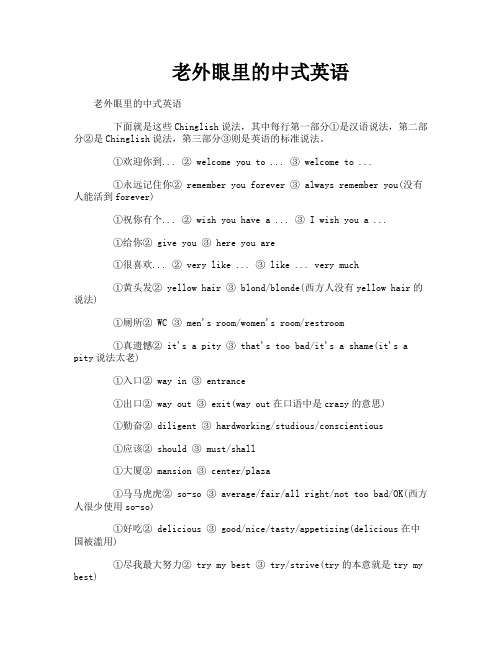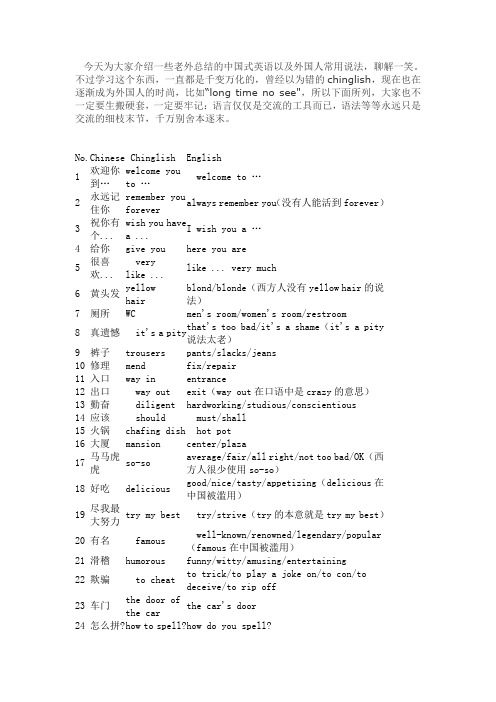老外眼里的中式英语——看看你说过哪一句
老外眼里的中式英语

老外眼里的中式英语老外眼里的中式英语下面就是这些Chinglish说法,其中每行第一部分①是汉语说法,第二部分②是Chinglish说法,第三部分③则是英语的标准说法。
①欢迎你到... ② welcome you to ... ③ welcome to ...①永远记住你② remember you forever ③ always remember you(没有人能活到forever)①祝你有个... ② wish you have a ... ③ I wish you a ...①给你② give you ③ here you are①很喜欢... ② very like ... ③ like ... very much①黄头发② yellow hair ③ blond/blonde(西方人没有yellow hair的说法)①厕所② WC ③ men's room/women's room/restroom①真遗憾② it's a pity ③ that's too bad/it's a shame(it's a pity说法太老)①入口② way in ③ entrance①出口② way out ③ exit(way out在口语中是crazy的意思)①勤奋② diligent ③ hardworking/studious/conscientious①应该② should ③ must/shall①大厦② mansion ③ center/plaza①马马虎虎② so-so ③ average/fair/all right/not too bad/OK(西方人很少使用so-so)①好吃② delicious③ good/nice/tasty/appetizing(delicious在中国被滥用)①尽我最大努力② try my best ③ try/strive(try的本意就是try my best)①有名② famous ③ well-known/renowned/legendary/popular(famous 在中国被滥用)①滑稽② humorous ③ funny/witty/amusing/entertaining①欺骗② to cheat ③ to trick/to pla y a joke on/to con/to deceive/to rip off①怎么拼? ② how to spell? ③how do you spell?①再见② bye-bye ③ bye/see you/see you later/later(bye-bye有些孩子气)①玩② play ③ go to/do(play在中国被滥用)①面条② noodles ③ pasta(noodles有些孩子气)①据说② it is said ③ I heard/I read/I w as told①等等② and so on ③ etc. etcetera①直到现在② till now ③ recently/lately/thus far①宣传② propaganda ③ information英语中12个典型的中国式错误1. 这个价格对我挺合适的。
你知道这些中式英语吗?老外也喜欢

你知道这些中式英语吗?老外也喜欢中式英语(论坛)再次成为了热点。
这次不再是指示牌上的英文错误,也不是餐馆不知所云的菜谱,而是中国人自创出来的新词汇:“Smilence”(笑而不语)、“Emotionormal”(情绪稳定),还有更富时代特色的“Chinsumer”(指到国外旅行疯狂购物的中国人)、“Vegeteal”(指开心网上的“摘菜”)。
人们在网络上传播和把玩着这些中式英语单词,新词还在不断被发明出来。
从最早我们自己讽刺初学者英文水平低,到后来好多外国人搜集散布在公共场合里不经意间的“巧妙”错用,再到如今中国人开始故意错用甚至自创英语单词,中式英语(Chinglish)的内涵在不断地被拓展,人们对中式英语的态度也由开始的拒绝、嘲笑转变为欣赏、把玩甚至鼓励。
语言是时代变迁最敏感的反应器,中式英语繁盛的背后是中外交往更加密切、中国国际影响力的增强———在“Long time no see”、“Good go od study,day day up”之后,也许会有更多中式英语成为外国人的日常用语。
更早的中式英语得数旧上海的“洋泾浜”,至今在中国语文课本选摘的民国时期散文里还留存着从英语音译的“水门汀”(Cement水泥)和“梵阿铃”(Violin小提琴)的字眼。
很长一段时间里,中国人的第一外语变成了俄语,直到改革开放后,国人普遍开始学习英语。
学校里的英语教师和新东方的老师开始要学生警惕“Chinese English”。
大学里请来的外教发现,中国人讲英语很容易照着汉语原来的习惯。
学生请假,说自己舒服会讲“I am uncomfortable”而不是“I don’t feel well”,外教得好久才能反应过来;中国人把厕所叫“WC”而不是“Restroom”,而“WC”在英语国家只是“茅坑”的意思。
浙江大学的一位美国外教去中国朋友家里做客时发现,中国人讲“饺子”和“豆腐”的单词都“名不副实”,“Dumpling”和“Chinese Bean curd”他们并不用,“Ravioli”和“Tofu”则被老外广泛接受———这两个词对英语来说也是外来语,分别来自意大利和日本。
中式英语笑翻歪果仁 地道雅思词汇的表达方式

中式英语笑翻歪果仁地道雅思词汇的表达方式一直可以看到在中国大家小巷里的“中式英语”警示牌,每每让歪果仁吐槽是不是又用了有道翻译。
今天,我们就来看看歪果仁盘点的几大让人笑掉大牙的中式英语表达。
小心滑倒Chinglish: Slip carefully (sometimes Carefully slip and fall down)。
Actually: Be careful not to slip and fall。
歪果仁:哈哈哈哈哈哈,笑死我了,小心地滑倒,OMG,滑倒还分小心和不小心吗?中国人的语言真是博大精深。
注意安全,坡道路滑Chinglish: To take notice of safe: The slippery are very crafty。
Actually: Pay attention to safety. The ramp is slippery。
歪果仁吐槽:小心就小心呗,怎么连语法都用错,slippery和crafty是一个意思好吧,slippery是形容词好吧,狡猾的是狡猾的,中间还用复数are,真是服了。
当别人准备离开去某地时,我们通常可用以下表达告诉Ta保重:1. Take care。
Take care on the roads. They are really icy。
路上小心,外面冷。
Tips:当我跟别人告别时,我总是这样叮嘱对方。
2. Mind how you go。
It was great seeing you. Mind how you go, the traffic is terrible on the motorway。
见到你很开心。
路上多加小心,高速公路路况很差的。
当人们马上就要面临危险时,我们用下面的说法:3. Look out!Look out! There’s a car coming。
小心,有车来了!4. Watch out!Watch out! The pavement is slippery。
老外眼中的中式英语

Avoid UseA)Hey Julia! How about your weekend?B)It was just so so. I stayed in my dormitory and had a rest. I also studybecause I have an examination in the weekend.A)Oh what a pity! I have an appointment with my companion to play afterclass. Do you want to join us?B)I would love to! I quarreled with my elder sister so I am a little sad. Playingwith you will make me feel happiness.A)Fine! I’ll meet you in the noon at the school’s front gate.B)Ok. Bye Bye!A)Katie, how do you do?B)Oh. I am just so so. How do you think about seeing a movie in the weekend?A)I am so busy. I haven’t any time. My aunt just gave birth to a baby, so I havean appointment to visit her.B)Ok I know.A)I am sorry, I would have liked to see a movie with you if I didn’t alreadyhave plansB)Ok. Nevermind1. If you could relive one day of your life, what day would you choose?2. What is a life lesson you have learned recently?3. What fascinates you?4. When did you realize life is short?5. What advice would you give to your younger self?6. What do you wish you spent more time doing 5 years ago?7. What makes someone a hero?8. If you were to write a book, what would you write about?9. What qualities do you look for in a friend? A significant other?10. Would you ever sacrifice your values for power, money, and fame?11. What are your passions?12. How do you define success?13. If you were able to eat dinner with three people, dead or alive, who would you invite?14. What would you like to have people say about you at your funeral?15. If you could be with anyone anywhere doing anything, who would you be with, what would you be doing, and where would you be?16. What gives your life meaning?17. When is the last time you stepped outside your comfort zone?18. If we learn from our mistakes, why are we afraid to make a mistake?。
老外眼里的中式英语

老外眼里的中式英语——看看你说过哪一句?在各个英语学习论坛上,经常可以看到有关Chinglish(中式英语)的文章,但一般都是中国人写的。
不过我看到过一篇长文,也是有关Chinglish的,但却是美国人写的,很有意思。
这篇长文的标题是Chinglish 2 English(从中式英语到标准英语),作者是浙江大学的美国外教Chuck Allanson,内容则是Chuck在中国五年任教期间所听到、所看到的各种Chinglish说法。
比如Chuck第一次来中国,下飞机后,负责接待他的东北某大学英语系陈老师说:您刚到,我们吃点饭吧。
我们要点Chinese dumpling(饺子)和Chinese beancurd(豆腐),您看可以吗?Chuck以前从未听说过这两种东西,但出于好奇,就说可以,结果饭菜端上来一看,原来就是ravioli(饺子,来自意大利语)和tofu(豆腐,来自日语)。
Chuck当时心里暗想,这两种东西,国际上早已经有通用的说法(ravioli和tofu),他们中国人为什么还要用那种生僻的说法呢?以后Chuck跟陈先生混熟了,就问他,当初你为什么不说ravioli 和tofu呢?陈先生听了大吃一惊,连忙解释说,我真的不知道这两个词,而且我们的《英汉词典》上也没有这两个词。
于是Chuck开始意识到,中国的英语教师、英语课本、甚至英语词典肯定存在问题,否则不可能发生这种事情。
在中国五年的任教期间,Chuck收集了大量的Chinglish说法,从中挑选出一组最常见的,编写了上面提到的那篇长文。
下面就是这些Chinglish说法,其中每行第一部分是汉语说法,第二部分是Chinglish说法,第三部分则是英语的标准说法。
①欢迎你到... ②welcome you to ... ③welcome to ...①永远记住你②remember you forever ③always remember you(没有人能活到forever)①祝你有个... ②wish you have a ... ③I wish you a ...①给你②give you ③here you are①很喜欢... ②very like ... ③like ... very much①黄头发②yellow hair ③blond/blonde(西方人没有yellow hair的说法)①厕所②WC ③men's room/women's room/restroom①真遗憾②it's a pity ③that's too bad/it's a shame(it's a pity说法太老)①裤子②trousers ③pants/slacks/jeans①修理②mend ③fix/repair①入口②way in ③entrance①出口②way out ③exit(way out在口语中是crazy的意思)①勤奋②diligent ③hardworking/studious/conscientious①应该②should ③must/shall①火锅②chafing dish ③hot pot①大厦②mansion ③center/plaza①马马虎虎②so-so ③average/fair/all right/not too bad/OK(西方人很少使用so-so)①好吃②delicious ③good/nice/tasty/appetizing(delicious在中国被滥用)①尽我最大努力②try my best ③try/strive(try的本意就是try my best)①有名②famous ③well-known/renowned/legendary/popular(famous在中国被滥用)①滑稽②humorous ③funny/witty/amusing/entertaining①欺骗②to cheat ③to trick/to play a joke on/to con/to deceive/to rip off①车门②the door of the car ③the car's door①怎么拼? ②how to spell? ③how do you spell?①再见②bye-bye ③bye/see you/see you later/later(bye-bye有些孩子气)①玩②play ③go to/do(play在中国被滥用)①面条②noodles ③pasta(noodles有些孩子气)①据说②it is said ③I heard/I read/I was told①等等②and so on ③etc. etcetera①直到现在②till now ③recently/lately/thus far①农民②peasant ③farmer①宣传②propaganda ③information英语中12个典型的中国式错误1. 这个价格对我挺合适的。
外国人说的四句话

外国人说的四句话外国人说的四句话是:“Your English is very good.”、“I love Chinese food.”、“China is such a beautiful country.”和“I would like to visit China someday.”这些话不仅表达了这些外国人对中国的喜爱和敬仰,也反映出中国和外国人民之间的友好关系和文化交流。
首先,“Your English is very good.”这句话说明了中国人的英语水平得到了外国人的认可。
这也意味着中国走向世界的步伐加快了,中国人有更多的机会了解和体验其他国家的文化,并更好地与世界沟通和合作。
其次,“I love Chinese food.”这句话表现了外国人对中国饮食文化的喜爱,中国菜已经成为世界各国喜爱的美食之一。
中餐的口感和味道已成为人们在旅游、商务交流和个人生活中必不可少的部分。
第三,“China is such a beautiful country.”这句话证明了外国人对中国独特的自然风光和丰富的历史文化的赞赏。
中国作为一个拥有着数千年历史和悠久文化的古国,拥有着壮丽的山水风光和博大精深的文化底蕴,吸引了众多外国游客的到来。
最后,“I would like to visit China someday.”这句话体现了外国人对中国的期待和愿望,也反映了中国的旅游业在国际上的潜力。
随着中国国力的不断增强和交通工具的快速发展,越来越多的外国游客来到中国,欣赏中国的美景和享受独特的文化体验。
总之,这四句话表达了外国人对中国的高度评价和渴望与中国之间的更多交流和合作,这种友好关系和文化交流将有助于促进世界的和平与发展。
外国人眼中的中式英语

外国人眼中的中式英语欢迎你到中:welcomeyouto...英:welcometo...永远记得你中:rememberyouforever英:alwaysrememberyou(没有人能活到forever)祝你有个...中:wishyouhavea...英:Iwishyoua...给你中:giveyou英:hereyouare很喜欢...中:verylike...英:like...verymuch黄头发中:yellowhair英:blond/blonde(西方人没有yellowhair的说法)中:WC英:men'sroom/women'sroom/restroom真遗憾中:it'sapity英:that'stoobad/it'sashame(it'sapity说法太老)裤子中:trousers英:pants/slacks/jeans修理中:mend英:fix/repair入口中:wayin英:entrance出口中:wayout英:exit(wayout在口语中是crazy的意思)勤奋中:diligent英:hardworking/studious/conscientious中:should英:must/shall火锅中:chafingdish英:hotpot大厦中:mansion英:center/plaza马马虎虎中:so-so英:average/fair/allright/nottoobad/OK (西方人很少使用so-so)好吃中:delicious英:good/nice/tasty/appetizing (delicious在中国被滥用)尽我最大努力中:trymybest英:try/strive(try的本意就是trymybest)有名中:famous英:well-known/renowned/legendary/popular (famous在中国被滥用)滑稽中:humorous英:funny/witty/amusing/entertaining欺骗中:tocheat英:totrick/toplayajokeon/todeceive/toripoff 车门中:thedoorofthecar英:thecar'sdoor怎么拼?中:howtospell?英:howdoyouspell?再见中:bye-bye英:bye/seeyou/seeyoulater/later(bye-bye有些孩子气)玩中:play英:goto/do(play在中国被滥用)中:itissaid英:Iheard/Iread/Iwastold等等中:andsoon英:etc.etcetera直到现在中:tillnow英:recently/lately/thusfar农民中:peasant英:farmer宣传中:propaganda英:information再来看看英语中12个典型的中国式错误,以免再犯吧!1.这个价格挺合适的。
老外总结的中式英语

今天为大家介绍一些老外总结的中国式英语以及外国人常用说法,聊解一笑。
不过学习这个东西,一直都是千变万化的,曾经以为错的chinglish ,现在也在逐渐成为外国人的时尚,比如“long time no see",所以下面所列,大家也不一定要生搬硬套,一定要牢记:语言仅仅是交流的工具而已,语法等等永远只是交流的细枝末节,千万别舍本逐末。
No. C hinese Chinglish English1 欢迎你到… welcome you to …welcome to … 2 永远记住你 remember you foreveralways remember you (没有人能活到forever ) 3 祝你有个... wish you have a ...I wish you a … 4 给你 give you here you are5 很喜欢... very like ...like ... very much 6 黄头发 yellow hair blond/blonde (西方人没有yellow hair 的说法)7 厕所 WC men's room/women's room/restroom8 真遗憾 it's a pity that's too bad/it's a shame (it's a pity 说法太老)9 裤子 trousers pants/slacks/jeans10 修理 mend fix/repair11 入口 way in entrance12 出口 way out exit (way out 在口语中是crazy 的意思) 13 勤奋 diligent hardworking/studious/conscientious14 应该 should must/shall15 火锅 chafing dish hot pot16 大厦 mansion center/plaza17 马马虎虎 so-so average/fair/all right/not too bad/OK (西方人很少使用so-so )18 好吃 delicious good/nice/tasty/appetizing (delicious 在中国被滥用)19 尽我最大努力try my best try/strive (try 的本意就是try my best ) 20 有名 famous well-known/renowned/legendary/popular (famous 在中国被滥用)21 滑稽 humorous funny/witty/amusing/entertaining22 欺骗 to cheat to trick/to play a joke on/to con/to deceive/to rip off23 车门 the door of the carthe car's door 24 怎么拼? how to how do you spell?spell?25 再见bye-bye bye/see you/see you later/later(bye-bye 有些孩子气)26 玩play go to/do(play在中国被滥用)27 面条 noodles pasta(noodles有些孩子气)28 据说it is said I heard/I read/I was told29 等等 and so on etc.30 直到现在till now recently/lately/thus far31 农民peasant farmer32 宣传 propaganda information。
- 1、下载文档前请自行甄别文档内容的完整性,平台不提供额外的编辑、内容补充、找答案等附加服务。
- 2、"仅部分预览"的文档,不可在线预览部分如存在完整性等问题,可反馈申请退款(可完整预览的文档不适用该条件!)。
- 3、如文档侵犯您的权益,请联系客服反馈,我们会尽快为您处理(人工客服工作时间:9:00-18:30)。
在各个英语学习论坛上,经常可以看到有关Chinglish(中式英语)的文章,但一般都是中国人写的。
不过我看到过一篇长文,也是有关Chinglish的,但却是美国人写的,很有意思。
这篇长文的标题是Chinglish 2 English(从中式英语到标准英语),作者是浙江大学的美国外教Chuck Allanson,内容则是Chuck在中国五年任教期间所听到、所看到的各种Chinglish说法。
比如Chuck第一次来中国,下飞机后,负责接待他的东北某大学英语系陈老师说:您刚到,我们吃点饭吧。
我们要点Chinese dumpling(饺子)和Chinese beancurd(豆腐),您看可以吗?Chuck以前从未听说过这两种东西,但出于好奇,就说可以,结果饭菜端上来一看,原来就是ravioli(饺子,来自意大利语)和tofu(豆腐,来自日语)。
Chuck 当时心里暗想,这两种东西,国际上早已经有通用的说法(ravioli和tofu),他们中国人为什么还要用那种生僻的说法呢?以后Chuck跟陈先生混熟了,就问他,当初你为什么不说ravioli和tofu呢?陈先生听了大吃一惊,连忙解释说,我真的不知道这两个词,而且我们的《英汉词典》上也没有这两个词。
于是Chuck开始意识到,中国的英语教师、英语课本、甚至英语词典肯定存在问题,否则不可能发生这种事情。
在中国五年的任教期间,Chuck收集了大量的Chinglish说法,从中挑选出一组最常见的,编写了上面提到的那篇长文。
下面就是这些Chinglish说法,其中每行第一部分是汉语说法,第二部分是Chinglish说法,第三部分则是英语的标准说法。
①欢迎你到...②welcome you to ...③welcome to ...①永远记住你②remember you forever③always remember you(没有人能活到forever)①祝你有个...②wish you have a ...③I wish you a ...①给你②give you③here you are①很喜欢...②very like...③like ... very much①黄头发②yellow hair③blond/blonde(西方人没有yellow hair的说法)①厕所②WC③men's room/women's room/restroom①真遗憾②it's a pity③that's too bad/it's a shame(it's a pity说法太老)①裤子②trousers③pants/slacks/jeans①修理②mend③fix/repair①入口②way in③entrance①出口②way out③exit(way out在口语中是crazy的意思)①勤奋②diligent③hardworking/studious/conscientious①应该②should③must/shall①火锅②chafing dish③hot pot①大厦②mansion③center/plaza①马马虎虎②so-so③average/fair/all right/not too bad/OK(西方人很少使用so-so)①好吃②delicious③good/nice/tasty/appetizing(delicious在中国被滥用)①尽我最大努力②try my best③try/strive(try的本意就是try my best)①有名②famous③well-known/renowned/legendary/popular(famous在中国被滥用)①滑稽②humorous③funny/witty/amusing/entertaining①欺骗②to cheat③to trick/to play a joke on/to con/to deceive/to rip off①车门②the door of the car③the car's door①怎么拼?②how to spell?③how do you spell?①再见②bye-bye③bye/see you/see you later/later(bye-bye有些孩子气)①玩②play③go to/do(play在中国被滥用)①面条②noodles③pasta(noodles有些孩子气)①据说②it is said③I heard/I read/I was told①等等②and so on③etc.etcetera①直到现在②till now③recently/lately/thus far①农民②peasant③farmer①宣传②propaganda③information英语中12个典型的中国式错误1.这个价格对我挺合适的。
误:The price is very suitable for me.正:The price is right.提示:suitable(合适的、相配的)最常见的用法是以否定的形式出现在告示或通知上,如:下列节目儿童不宜。
The following programme is not suitable for children.这句话用后面的说法会更合适。
2.你是做什么工作的呢?误:What's your job?正:Are you working at the moment?What kind of work are you?提示:what's your job这种说法难道也有毛病吗?是的。
因为如果您的谈话对象刚刚失业,如此直接的问法会让对方有失面子,所以您要问:目前您是在上班吗?Are you working at the moment?接下来您才问:目前您在哪儿工作呢?Where are you working these days?或者您从事哪个行业呢?What line of work are you in?3.用英语怎么说?误:How to say?正:How do you say this in English?提示:How to say是在中国最为泛滥成灾的中国式英语之一,这绝不是地道的英语说法。
同样的句子有:请问这个词如何拼写?How do you spell that please?请问这个单词怎么读?How do you pronounce this word?4.明天我有事情要做。
误:I have something to do tomorrow.正:I am tied up all day tomorrow.提示:用I have something to do来表示您很忙,这也完全是中国式的说法。
因为每时每刻我们都有事情要做,躺在那里睡大觉也是事情。
所以您可以说我很忙,脱不开身:I'm tied up.还有其他的说法:I can't make it at that time. I'd love to, but I can't, I have to stay at home.5.我没有英文名。
误:I haven't English name.正:I don't have an English name.提示:许多人讲英语犯这样的错误,从语法角度来分析,可能是语法功底欠缺,因为have在这里是实义动词,而并不是在现在完成时里面那个没有意义的助动词。
所以,这句话由肯定句变成否定句要加助动词。
明白道理是一回事,习惯是另一回事,请您再说几话:我没有钱;I don't have any money.我没有兄弟姐妹;I don't have any brothers or sisters.我没有车。
I don't have a car.6.我想我不行。
误:I think I can't.正:I don't think I can.提示:汉语里说“我想我不会”的时候,英语里面总是说“我不认为我会”。
以后您在说类似的英语句子的时候,只要留心,也会习惯英语的表达习惯的。
7.我的舞也跳得不好。
误:I don't dance well too.正:I am not a very good dancer either.提示:当我们说不擅长做什么事情的时候,英语里面通常用not good at something,英语的思维甚至直接踊跃到:我不是一个好的舞者。
8.现在几点钟了?误:What time is it now?正:What time is it, please?提示:What time is it now是一个直接从汉语翻译过的句子,讲英语的时候没有必要说now,因为您不可能问what time was it yesterday,或者what time is it tommorow?所以符合英语习惯的说法是:请问现在几点了?还有一种说法是:How are we doing for time?这句话在有时间限制的时候特别合适。
9.我的英语很糟糕。
误:My English is poor.正:I am not 100% fluent, but at least I am improving.提示:有人开玩笑说,全中国人最擅长的一句英文是:My English is poor.外国人遇到自己外语不好的情况,他们会说: I am still having a few problem, but I am getting better.10.你愿意参加我们的晚会吗?误:Would you like to join our party on Friday?正:Would you like to come to our party on Friday night?提示:join往往是指参加俱乐部或者协会,如:join a health club; join the Communist Party.事实上,常常与party搭配的动词是come或者go。
如go a wild party,或者come to a Christmas Party。
11.我没有经验。
误:I have no experience.正:I don't know much about that.提示:I have no experience这句话听起来古里古怪,因为您只需要说那方面我懂得不多,或者这方面我不在行,就行了。
I am not really an expert in this area.12. ——这个春节你回家吗?——是的,我回去。
